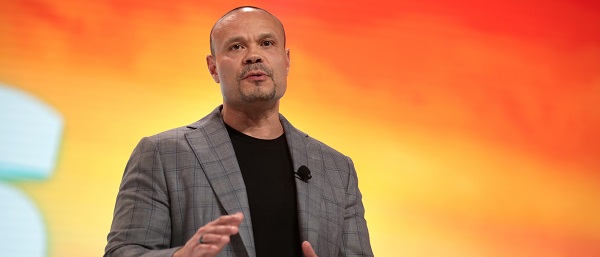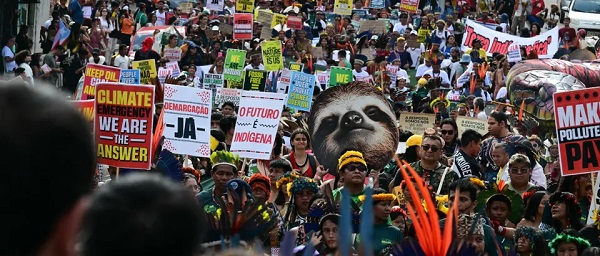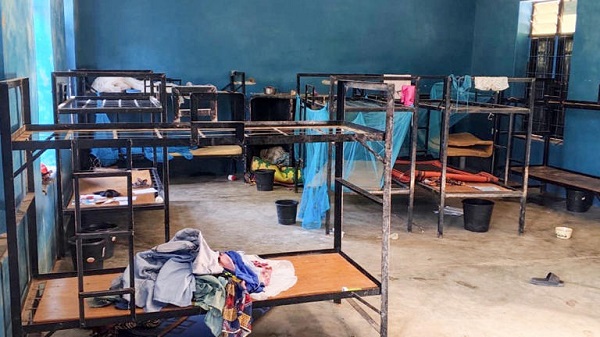Daily Caller
Trump Taps Dan Bongino For FBI Deputy Director


From the Daily Caller News Foundation
By Hailey Gomez
President Donald Trump announced Sunday evening that he has named former Secret Service agent and podcast host Dan Bongino as the new deputy director of the FBI, according to a social media post.
Bongino, who has been an outspoken advocate for Trump and raised serious concerns following the first near-assassination of the president on July 13, was reportedly being considered for the position of U.S. Secret Service director in November 2024, according to CNN. However, late Sunday, Trump took to social media, congratulating Bongino for his “love and passion” for the U.S., noting that he will be working with newly appointed FBI Director Kash Patel and Attorney General Pam Bondi.
“Dan Bongino, a man of incredible love and passion for our Country, has just been named the next DEPUTY DIRECTOR OF THE FBI, by the man who will be the best ever Director, Kash Patel. Dan has a Masters Degree in Psychology from C.U.N.Y., and an MBA from Penn State,” Trump wrote.
“Working with our great new United States Attorney General, Pam Bondi, and Director Patel, Fairness, Justice, Law and Order will be brought back to America, and quickly,” Trump added.
Bongino had previously served with the New York Police Department in 1995 to 1999 before becoming a Secret Service special agent in 1999 until 2011. Bongino later transitioned to hosting a podcast, “The Dan Bongino Show,” in 2017.
The announcement of Bongino’s new role comes shortly after Patel was confirmed as the FBI’s new director on Thursday, with the Senate finalizing the nomination with a 51-49 vote. Following the announcement, Bongino posted on his X platform, thanking Trump, Bondi and Patel.
Daily Caller
EXCLUSIVE: Here’s An Inside Look At The UN’s Disastrous Climate Conference


From the Daily Caller News Foundation
By Audrey Streb
The United Nations’ annual climate conference concluded Saturday, and some critics in attendance told the Daily Caller News Foundation that it was a chaotic affair.
After Thursday’s fire forced an evacuation and temporarily halted the talks, COP30 was prolonged by an extra day. Corporate media outlets and green groups critiqued the final agreement reached on Saturday, arguing that it did not do enough to restrict carbon emissions. The environmental groups claimed the resolution departed from COP28’s declaration which called for an end to fossil fuels.
Hosted in Belém, Brazil, COP30 provoked backlash after developers razed the Amazon rainforest ahead of the climate talks and China worked to seize the spotlight in America’s absence. Craig Rucker, co-founder and president of the conservative nonprofit known as the Committee for a Constructive Tomorrow,(CFACT) told the DCNF that this year’s UN climate talks were especially chaotic and disorganized.
Dear Readers:
As a nonprofit, we are dependent on the generosity of our readers.
Please consider making a small donation of any amount here.
Thank you!
“I’ve been to 27 of the 30 conferences. … What you see on the ground is just how chaotic it’s gotten. There was a certain chaos in the past, but this was particularly disorganized because they picked a venue that I think was unsuited for all the delegates that were coming in,” Rucker told the DCNF in an interview. “They wanted to emphasize the rainforest, yet hypocritically, they’re chopping them down to accommodate delegates flying in on private jets.”
The UN did not respond to the DCNF’S request for comment.
Rucker and Marc Morano, who publishes CFACT’s ClimateDepot.com, ventured into the Amazon rainforest to investigate the four-lane highway initially reported by BBC in March. Rucker told the DCNF that Brazil was “still cutting and burning. We heard the chainsaws ourselves, and this is something they [the Brazilian state] try to keep [quiet].”
The highway, known as Avenida Liberdade, was shelved multiple times in the past due to environmental concerns but revived as part of a broader push to modernize Belém ahead of COP30, according to the outlet. State officials say the development efforts will leave a lasting legacy, including an expanded airport, new hotels and an ungraded port to accommodate cruise ships.
The Brazilian state denied that the highway was built for the climate conference, noting that plans for the road were underway as early as 2020 — well before Brazil was selected to host COP30, Reuters reported in March.
President Donald Trump sharply criticized the conference for deforesting portions of the Amazon to ease travel for environmentalist attendees. The U.S. did not send an official delegation this year.
Democratic California Gov. Gavin Newsom and Democratic Rhode Island Sen. Sheldon Whitehouse attended the talks, where they denounced the Trump administration’s energy policies and absence.
A top United Nations official reportedly directed Brazilian authorities to address concerns including leaky light fixtures, sweltering heat and lackluster security at the conference, according to Bloomberg News. Days later, the fire broke out.
Morano also documented water pouring from vents, and Rucker told the DCNF that attendees were not allowed to flush toilet paper as the venue “didn’t have a septic system.”
Rucker also recalled what he described as elitism, noting that delegates were in the “blue zone” while other attendees and indigenous groups were relegated to the “green zone.”
“The blue zone is where the official delegates go, the people that are from Spain, Portugal, Brazil. … And these are the people that make the decisions,” Rucker said. “The indigenous people, they say, don’t have a voice allowed in there. That’s partially why they crashed it.”
Though COP30 did host several events featuring indigenous voices, some native groups stormed the COP30 venue the first week, demanding their voice be heard by the UN.
Rucker told the DCNF that China seemed to have become a “new leader” on the environmentalism and green energy front at the climate conference, though the oriental nation is “pumping out with two coal plants per week.”
Recent media reports have hailed China as a giant in building out “renewables,” though China is far from dependent on intermittent resources like solar and wind as it also churns out new coal plants and is the world’s top emitter.
“They genuinely looked at China as the world leader on climate change,” Rucker noted, branding it as “totally bizarre.”
Rucker recalled that upon the entrance of the “blue zone,” there was a “very impressive Chinese booth.”
Additionally, a statue demeaning Trump stood outside COP30, according to Reuters, as well as a horned jaguar-dragon hybrid statue with its hands gripping the globe. The fanged construction purportedly represented China and Brazil partnering to protect the rainforest.
“The statues are purely political statements: one symbolizes how communism is alive and well in Brazil and China, and the other is a misguided attempt to shame or critique Trump,” Director of the Arthur B. Robinson Center on Climate and Environmental Policy at The Heartland Institute Sterling Burnett told the DCNF. “Trump’s promotion of fossil-fuel development and broader use — especially encouraging developing countries to tap into affordable energy — will do more to help children in poor countries than all the climate agreements and green energy scams combined.”
Business
The UN Pushing Carbon Taxes, Punishing Prosperity, And Promoting Poverty


From the Daily Caller News Foundation
Unelected regulators and bureaucrats from the United Nations have pushed for crushing the global economy in the name of saving the planet.
In October, the International Maritime Organization (IMO), a specialized agency within the U.N., proposed a carbon tax in order to slash the emissions of shipping vessels. This comes after the IMO’s April 2025 decision to adopt net-zero standards for global shipping.
Had the IMO agreed to the regulation, it would have been the first global tax on greenhouse gas emissions. Thankfully, the United States was able to effectively shut down those proposals; however, while these regulations have been temporarily halted, the erroneous ideas behind them continue to grow in support.
Proponents of carbon taxes generally argue that since climate change is an existential threat to human existence, drastic measures must be taken in all aspects of our lives to address the projected costs. People should eat less meat and use public transportation more often. In the political arena, they should vote out so-called “climate deniers.” In the economic sphere, carbon taxes are offered as a technocratic quick fix to carbon emissions. Is any of this worth it? Or are the benefits greater than the costs? In the case of climate change, the answer is no.
Carbon taxes are not a matter of scientific fact. As with all models, the assumptions drive the analysis. In the case of carbon taxes, the time horizon selected plays a major role in the outcome. So, too, does the discount rate and the specific integrated assessment models.
In other words, “Two economists can give vastly different estimates of the social cost of carbon, even if they agree on the objective facts underlying the analysis.” If the assumptions are subjective, as they are in carbon taxes, then they are not scientific facts. As I’ve pointed out, “carbon pricing models are as much political constructs as they are economic tools.” One must also ask whether carbon taxes will remain unchanged or gradually increase over time to advance other political agendas. In this proposal, the answer is that it increases over time.
Additionally, since these models are driven by assumptions, one would be right in asking who gets to impose these taxes? Of course, those would be the unelected bureaucrats at the IMO. No American who would be subject to these taxes ever voted for the people attempting to create the “world’s first global carbon tax.” It brings to mind the phrase “no taxation without representation.”
In an ironic twist, imposing carbon taxes on global shipping might actually be one of the worst ways to slash emissions, given the enormous gains from trade. Simply put, trade makes the world grow rich. Not just wealthy nations like those in the West, but every nation, even the most poor, grows richer. In wealthy countries, trade can help address climate change by enabling adaptation and innovation. For poorer countries, material gains from trade can help prevent their populations from starving and also help them advance along the environmental Kuznets curve.
In other words, the advantages of trade can, over time, make a country go from being so poor that a high level of air pollution is necessary for its survival to being rich enough to afford reducing or eliminating pollution. Carbon taxes, if sufficiently high, can prevent or significantly delay these processes, thereby undermining their supposed purpose. Not to mention, as of today, maritime shipping accounts for only about 3% of total global emissions.
The same ingenuity that brought us modern shipping will continue to power the global economy and fund growth and innovation, if we let it. The world does not need a layer of global bureaucracy for the sake of virtue signaling. What it needs is an understanding of both economics and human progress.
History shows that prosperity, innovation, and free trade are what make societies cleaner, healthier, and richer. Our choice is not between saving the planet and saving the economy; it is between free societies and free markets or surrendering responsibility to unelected international regulators and busybodies. The former has lifted billions out of poverty, and the latter threatens to drag us all backwards.
Samuel Peterson is a Research Fellow at the Institute for Energy Research.
-

 Alberta2 days ago
Alberta2 days agoPremier Smith explains how private clinics will be introduced in Alberta
-

 Censorship Industrial Complex2 days ago
Censorship Industrial Complex2 days agoUK Government “Resist” Program Monitors Citizens’ Online Posts
-

 Business2 days ago
Business2 days agoUS Supreme Court may end ‘emergency’ tariffs, but that won’t stop the President
-

 Bruce Dowbiggin2 days ago
Bruce Dowbiggin2 days agoElbows Down For The Not-So-Magnificent Seven: Canada’s Wilting NHL Septet
-

 International2 days ago
International2 days ago“The Largest Funder of Al-Shabaab Is the Minnesota Taxpayer”
-

 Alberta2 days ago
Alberta2 days agoAlberta introducing dual practice health care model to increase options and shorten wait times while promising protection for publicly funded services
-

 International2 days ago
International2 days ago50 of the 315 students and 12 staff abducted from Catholic school in Nigeria last week have escaped
-

 espionage1 day ago
espionage1 day agoSoros family has been working with State Department for 50 years, WikiLeaks shows






